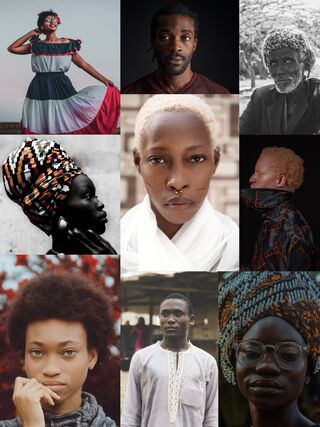Psychology
The Inevitability That Is Black Migration
Using Black psychology to support Black migrants.
Posted September 9, 2022 Reviewed by Abigail Fagan
Key points
- Black migrants are made invisible in immigration narratives, with the intersection of race and migration creating further marginalization.
- Black migrants are diverse and experience unique psychological challenges.
- Black psychology frameworks can be used to promote visibility of Black migrant experiences.

This post was written by Ammy Sena, MA, Jatawn Tickles, MA, and Collette Chapman-Hilliard, Ph.D., doctoral students and Associate Professor of Counseling Psychology at the University of Georgia.
Racial tensions surrounding Black people in America have been prevalent for centuries, bringing to the forefront anti-Black rhetoric. However, issues surrounding Black migrants' experiences have recently called for Black allies to examine the marginalization of race and immigration.
In September 2021, media images depicting U.S. Border Patrol agents whipping Haitian migrants in Rio Grande, Texas, mirrored historical representations of enslaved Africans physically abused by White slave owners. As a Black immigrant woman (first author, Sena), I was emotionally triggered. Feelings that commonly characterize racial trauma such as anger and confusion fueled me as I questioned how it is possible for such encounters to still exist.
While this event may have been centered on Haitians, the harmful treatment of Black immigrants remains invisible—stories of Black immigrants continue to be silenced in our society. For us to provide equitable support to Black migrants, we need to reshape how we attend to the role of race in Black immigrant narratives. As has been decisively documented, the history of Black and white race relations in the United States has expanded over the course of 400 years, creating discriminatory and prejudicial treatment toward Black people. These negative and often insidious attitudes toward Black people permeate immigration experiences for Black migrants. We see this as we note the treatment of Haitians in Rio Grande; darker-skinned individuals face harsher immigration policies and have less access to protective statuses.
Migration in Black Communities
Migration is an essential form of survival for many persons, as they seek to escape experiences like financial insecurity, persecution, violence, exploitation, and environmental disasters. Starting with the forced migration of Africans through the Transatlantic Slave Trade in 1619 to the more recent (1990) migration of persons through the Diversity Visa Program, we see that those of the African Diaspora are not exempt from migration.
In addition, recent studies indicate current and future trends involving Black migrants in the United States. A recent NPR article stated that 1 in 10 Black people in the United States are migrants. The Pew Research Center projects that in 2060 about a third of the U.S. Black population will be Black migrants. Therefore, it is undeniable that the migration of Black people across the Diaspora is inevitable. However, what does this mean for those of the African Diaspora who seek to gain freedoms and equitable treatment when considering racial discrimination and racist ideologies plaguing the United States?
Black Psychology as a Means of Promoting Visibility for Black Immigrants
Black psychology offers a unique outlook as it focuses on the well-being of those across the African Diaspora and thus embodies various perspectives that can support the mental health of Black immigrants as well. Given the unique intersection of being both Black and an immigrant, we rely on Black psychological literature to explore how we can support Black migrants and encourage readers to consider using Black psychology to increase visibility and well-being among Black migrants.
- Challenge ideas of Black immigrants as a monolith. Although our phenotypic features and skin color create shared experiences among African-descent people, significant differences exist (i.e., within-group heterogeneity). Ethnic and cultural identity vary across Black immigrants, and country of origin heavily influences racial and ethnic identity development. An article from the Pew Research Center highlights the diversity of Black immigrants, stating the top five countries of Black migrants in 2019 were Jamaica, Haiti, Nigeria, Ethiopia, and the Dominican Republic. Thus, we cannot assume that Black immigrants are all the same.
- Recognize the psychological implications of racial and ethnic identity on Black migrants. When entering the United States, Black migrants may not identify with the identities and cultural practices of Black Americans. In fact, Black migrants are more likely to identify with their ethnicity or country of origin more saliently than with race. This may create distress as they adapt to their new environment. However, a sense of belonging with Black Americans is associated with lower rates of depression for Black migrants (Hunter et al., 2017). Therefore, we consider how Black racial identity development and ethnic identity development help us understand Black immigrants' identity-based experiences and shed light on how to talk about those experiences in racialized contexts like the United States. Examining these frameworks holds space for Black migrants to explore their ethnic-racial identity and related cultural practices offering opportunity for Black migrants to likely better acculturate to their new environment and improve their psychological well-being.
- Identify and use Black liberation perspectives to support the well-being of Black migrants. Black psychologists have and continue to promote Black liberation in psychology in a way that encompasses an inclusive approach to the experiences of Black people across the African Diaspora including Black migrants. Black liberation psychology has its roots in the works by Frantz Fanon, who, as a psychiatrist from Martinique, often explored the effects of colonization on the mental health of Black people across the diaspora and the need for decolonial practices for their liberation. Current models within Black psychology that highlight Black liberation can be seen in Chapman-Hilliard and Adams Bass's (2016) Black History Knowledge Model for Coping and Mental Health and the Radical Healing framework discussed in a previous Psychology Today post.
There is great richness in highlighting the diversity within the African Diaspora, which includes variability in language, spiritual beliefs/practices, customs, values, and socio-political histories. Even with all this beauty and richness within the Diaspora, Black immigrants are not immune from the confines of U.S.-based racism and discrimination. If we are to utilize the fullness of the power of Black psychology, it necessitates we see Black immigrants, hear their stories, and combat anti-Black sentiments across the entire African Diaspora.


